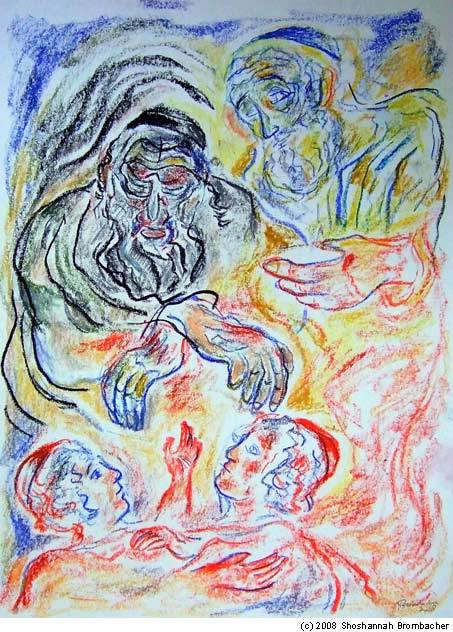 Rabbi David Etengoff ה' יעזור וירחם על אחינו, כל בני ישראל בארץ ישראל ובכל חלקי הארץ Sefer Bereishit presents three celebrated name changes that were declared by the Almighty or one of His angels. The first two were Avram and Sarai, whose names were changed to Avraham and Sarah: And Avram fell upon his face, and G-d spoke with him, saying…your name shall no longer be called Avram, but your name shall be Avraham, for I have made you the father of a multitude of nations. And Hashem said to Avraham, “Your wife Sarai − you shall not call her name Sarai, for Sarah is her name.” (17:3, 5, and 15, these and all Bible translations, The Judaica Press Complete Tanach) Midrash Bereishit Rabbah makes it very clear that Avraham’s name change is absolute and universal in nature, to the extent that it is forbidden to call him by his prior appellation: Bar Kapparah said: “Anyone who calls Avraham, ‘Avram’ [from this time forward] will violate a positive commandment (aseh).” Rabbi Lavi said: “He will not only disobey a positive directive, but he will also transgress a negative prohibition (lo ta’aseh), as well: ‘Your name shall no longer be called Avram,’ is the negative prohibition, and ‘Your name shall be Avraham,’ is the positive commandment.’” (Seder Vayishlach 78:3, this and the following translation and brackets my own) According to our midrash, however, Sarah’s name change is directed solely to Avraham, since the verse reads: “Your wife Sarai—you shall not call her name Sarai, for Sarah is her name.” In other words, Hashem gave Avraham a clear-cut personal directive to help him understand that his beloved wife was no longer his princess alone (“Sarai”), rather, she was now ready to take her place on the stage of world history as “Sarah.” As the verse states: “I will bless her, and she will become [a mother of] nations; kings of nations will be from her.” (17:16) Our parasha contains the third divinely decreed name change that narrate Ya’akov’s transition from Ya’akov to Yisrael: And he [Eisav’s angel] said, “Your name shall no longer be called Ya’akov, but Yisrael, because you have commanding power with [an angel of] G-d and with men, and you have prevailed. Hashem said to him, “Your name is Ya’akov. Your name shall no longer be called Ya’akov, but Yisrael shall be your name.” And He named him Yisrael. (32:29 and 35:10) On the surface, these pasukim seem quite similar. A considered reading reveals, however, that there are two different speakers; in 32:29, Eisav’s angel declares Ya’akov’s name change, whereas in 35:10, the speaker is the Almighty. In addition, 32:29 appears to depict a permanent name change, “Your name shall no longer be called Ya’akov, but Yisrael,” whereas in 35:10, Hashem somewhat curiously reminds Ya’akov, “Your name is Ya’akov,” prior to stating, “Your name shall no longer be called Ya’akov, but Yisrael shall be your name.” The confluence of these two verses led our midrash to ask whether Ya’akov’s name change to Yisrael was similar to his grandfather’s transformation from Avram to Avraham, or was it substantively different? Is it the case that one who calls Ya’akov “Ya’akov” will be in violation of a positive commandment [as in the case of Avraham/Avraham]? It has been taught: The name, “Ya’akov,” has not been uprooted, rather, the name Yisrael is now the essential appellation, whereas, the name, “Ya’akov,” is now of secondary import. [The opposite approach was offered by] Rabbi Zechariah in the name of Rabbi Acha — [Hashem told Ya’akov] that his primary name remained “Ya’akov,” but henceforth, “Yisrael will be your name.” In other words, “Ya’akov” was his main name, and “Yisrael” was his additional secondary name. Based on a close reading of the two opinions in the midrash, Ya’akov, unlike Avraham, retains his original name. The only question under debate is whether or not “Ya’akov” remains his essential name, or is it somehow eclipsed by the new name, “Yisrael?” In my view, the midrash is teaching us a profound lesson regarding Ya’akov’s very nature: henceforth he has a dual persona that is reflected by each of these names. As such, there are periods when he thrives as Ya’akov and lives as “an innocent man, dwelling in tents,” (25:27) and there are times when he must rise to existential challenges and be Yisrael, the one who has “commanding power with [an angel of] G-d and with men.” (32:29) The Ya’akov persona is illustrated by the prophet Michah when he speaks of him in this manner: “You (Hashem) shall give the truth of Ya’akov (emet l’Ya’akov), the loving-kindness of Avraham, which You swore to our forefathers from days of yore.” (Sefer Michah 7:20) In my estimation, Emet l’Ya’akov is only possible when Ya’akov is living a tranquil and introspective existence. Little wonder, then, that the first pasuk of Parashat Vayeshev states: “Ya’akov dwelt (vayeshev) in the land of his father’s sojourning, in the land of Canaan.” (37:1) In line with this analysis, Midrash Rabbah, Bereishit 84:3 interprets “vayeshev” as Ya’akov’s manifest desire to dwell serenely (b’shalveh) in the Land of Canaan, the land of his grandfather and father. May we be zocheh (merit) to see the fulfillment of emet l’Ya’akov, and the final words of the Kaddish realized in our time: “May He Who makes peace in His celestial heights make peace in His ultimate compassion for us and for all the Jewish people.” May this take place soon and, in our days, v’chane yihi ratzon. Shabbat Shalom Past drashot may be found at my blog-website: http://reparashathashavuah.org Please contact me at [email protected] to be added to my weekly email list. *** My audio shiurim on the topics of Tefilah and Tanach may be found at: http://tinyurl.com/8hsdpyd *** I have posted 164 of Rabbi Soloveitchik’s English language audio shiurim (MP3 format) spanning the years 1958-1984. Please click on the highlighted link: The Rav
0 Comments
 Rabbi David Etengoff ה' יעזור וירחם על אחינו, כל בני ישראל בארץ ישראל ובכל חלקי הארץ Our parasha begins with the famous words, “And Ya’akov left Beersheba, and he went to Haran.” (Sefer Bereishit 28:10, this and all Bible and Rashi translations, The Judaica Press Complete Tanach) His departure is a direct response to Rivka’s wishes, and Yitzchak’s earlier two-part statement: And Rivka said to Yitzchak, “I am disgusted with my life because of the daughters of Heth. If Ya’akov takes a wife of the daughters of Heth like these, from the daughters of the land, [Canaan] of what use is life to me?” (27:46, brackets my own) And Yitzchak called Ya’akov and blessed him, and he commanded him and said to him, “You shall not take a wife of the daughters of Canaan. Arise, go to Padan Aram, to the house of Betuel, your mother’s father, and take yourself from there a wife of the daughters of Lavan, your mother’s brother.” (28:1-2) Ya’akov fulfills his filial responsibility with alacrity and arrives “at the place and lodged there because the sun had set, and he took some of the stones of the place and placed [them] at his head, and he lay down in that place.” In a celebrated gloss in his Commentary on the Torah, Rashi (1040-105) identifies the place cited in this verse as Har Moriah, the location of both Akeidat Yitzhak and the future Beit HaMikdash. It is precisely in this location that the following miracle took place: And he dreamt and behold! a ladder set up on the ground (sulam mutzav artzah) and its top reached to heaven (v’rosho magiya od hashamaimah); and behold, angels of G-d were ascending and descending upon it. And behold, Hashem was standing over him, and He said, “I am Hashem, the G-d of Avraham your father, and the G-d of Yitzchak; the land upon which you are lying, to you I will give it and to your children.” (28:12-13, emendations my own) Our verse contains the sole instance in Tanach of the term “sulam.” Such an unusual word naturally captured the exegetical imaginations of Torah commentators throughout the ages. As such, we find the following Gematria-based interpretation of Ya’akov’s dream by Rabbi Shimon bar Yochai, the famed author of the Zohar: “And he dreamt:” Rabbi Shimon bar Yochai said: “[The Almighty] showed him [Ya’akov] Har Sinai. [What indication do we have in the verse that this is so?] The letter samech in Sinai equals 60, the first and last yud(s) [each] equal 10, and the nun is equivalent to 50. This adds up to 130—the exact same numerical value of the word “sulam.” In addition, in our verse, we find the expression, “mutzav artzah v’rosho magiya od hashamaimah,” [in regard to the sulam,] and in reference to Har Sinai we find, “…and the mountain burned with fire up to the midst of the heavens (hashamayim).” (Sefer Devarim 4:11, passage source, Midrash Tanchuma, Solomon Buber edition, Parashat Vayetze VII, translation and brackets my own) In sum, for Rabbi Shimon bar Yochai, the sulam is Ya’akov’s prophetic on-ramp to a vision of the future Revelation at Har Sinai. We are not surprised, therefore, when Ya’akov proclaims: “How awesome is this place! This is none other than the house of God, and this is the gate of heaven.” (28:17) Like Rabbi Shimon bar Yochai, the 14th century Torah scholar Rabbi Yaakov ben Asher was a master of using Gematria to elucidate the Torah’s meaning. In his Commentary on the Torah, he notes that the word “sulam” is the numerical equivalent of kol (130, voice), and joins this observation with a citation from the Zohar, I:266: “The voice of the righteous (tzaddikim) in prayer is the ladder upon which the angels ascend.” Shortly thereafter he states: “Everyone, therefore, who has true intention (kavanah) and heartfelt dedication in their prayers has a ladder with complete rungs upon which the angels will be able to ascend [to Heaven].” According to this interpretation of the Zohar, it appears that tzaddikim, by definition, have the ability to imbue their tefilah with deep level kavanah. Moreover, their prayers are so powerful and of such great import to HaKadosh Baruch Hu that they serve as a vehicle whereupon the angels can travel to heaven. We are neither prophets like Ya’akov, nor tzaddikim like those referenced in the Zohar. Nonetheless, we can invest our tefilot with heartfelt kavanah in order to feel that we are standing before the Holy One blessed be He. Then, with the help of the Almighty, we, too, will build ladders upon which “the angels will be able to ascend [to Heaven].” V’chane yihi ratzon. Shabbat Shalom Past drashot may be found at my blog-website: http://reparashathashavuah.org Please contact me at [email protected] to be added to my weekly email list. *** My audio shiurim on the topics of Tefilah and Tanach may be found at: http://tinyurl.com/8hsdpyd *** I have posted 164 of Rabbi Soloveitchik’s English language audio shiurim (MP3 format) spanning the years 1958-1984. Please click on the highlighted link: The Rav  Rabbi David Etengoff ה' יעזור וירחם על אחינו, כל בני ישראל בארץ ישראל ובכל חלקי הארץ Our parasha contains a pivotal narrative in the lives of the Avot, namely, a famine in Eretz Yisrael coupled with Yitzchak’s desire to travel to Egypt to avoid starvation. Unlike Avraham Avinu who faced the same scenario and traveled to Egypt, Hashem reveals himself to Yitzchak and commands him to remain in Eretz Yisrael: “And Hashem appeared to him, and said, ‘Do not go down to Egypt; dwell in the land that I will tell you.’” (Sefer Bereishit 26:2, this and all Bible and Rashi translations, The Judaica Press Complete Tanach) In addition to Hashem’s command to “dwell in the land that I will tell you,” He informs Yitzchak he will have numerous offspring, and the brit made with Avraham will be fulfilled through him: Sojourn in this land, and I [Hashem] will be with you, and I will bless you, for to you and to your children will I give all these lands, and I will establish the oath that I swore to Avraham, your father. And I will multiply your children like the stars of the heavens, and I will give your children all these lands, and all the nations of the earth will bless themselves by your children. (26:3-4, emendations my own) The Torah often refrains from providing a rationale for future events. In our case, however, Hashem explicitly tells Yitzchak the precise reason why he will receive these multiple brachot, “Because Avraham hearkened to My voice, and kept My charge (mishmarti), My commandments (mitzvotai), My statutes (chuchotai), and My instructions (torotai).” (26:5) Rashi explains these terms in the following manner: Mishmarti: [Referring to] decrees to distance [himself] from transgressing the warnings in the Torah, e.g. secondary prohibitions to prevent incest from occurring, and the Rabbinic decrees to safeguard the prohibitions of the Sabbath. Mitzvotai: [Referring to] things, which, had they not been written, would have been fit to be commanded, e.g. [prohibitions against] robbery and bloodshed. Chuchotai: [Referring to] things that the evil inclination and the nations of the world argue against, e.g. [the prohibitions against] eating pork and wearing garments of wool and linen for which no reason [is given], but [which are] the decree of the King and His statutes over His subjects. Torotai: To include the Oral Law, the laws given to Moses from Sinai. Rashi’s analysis is based upon a variety of Rabbinic sources that maintain that Avraham fulfilled the entire Torah, up to and including Rabbinic decrees and enactments—many generations before it was given at Mount Sinai. By way of illustration: Rab said: “Our father Avraham kept the entire Torah, as it is said: ‘Because Avraham hearkened to My voice [kept My charge, My commandments, My statutes, and My instructions].’” (Sefer Bereishit 26:5) …Raba or R. Ashi said: “Avraham, our father, kept even the law concerning the eruv tavshilin as it is said: ‘My Torahs:’ one being the Written Torah, the other the Oral Torah.” (Talmud Bavli, Yoma 28b, translation, The Soncino Talmud, with my emendations to enhance clarity) Why did Avraham fulfill the Torah if he was not commanded to do so? My rebbe and mentor, Rabbi Joseph B. Soloveitchik zatzal (1903-1993), known as “the Rav” by his students and followers, guides us toward an answer: In many respects, God was closer to Avraham than He was to Moses. An intangible feeling of tenderness lingers over the relationship of God to Avraham. There is the creative ardor, moving devotion and a lack of tension. All that God requests of Avraham is destined to promote the latter’s happiness and greatness. (The Emergence of Ethical Man, Michael S. Berger, page 155) The Rav further notes that Avraham acquired the moral law, and I believe, by extension, the Halacha, through “the mahazeh, the prophetic vision, not the royal decree [as in the case of Moses].” He continues this theme and suggests, “There is no imposition of divine authority… Only a bilateral covenant, which binds both man and God, was concluded.” According to the Rav, Avraham was Hashem’s friend; thus, once Avraham received his divine prophetic visions, he did everything in his power to comply with the Almighty’s every request: God addresses Himself to Avraham not in the commanding, authoritative tone of the L-rd but in the comradely, friendly manner of a fellow wanderer. He [God] wants a covenant with him. God, as it were, is lonesome and He is anxious to find a companion. Fellowship between God and man is the motto of Avraham’s life. (154-155, all brackets and underlining my own) Rav Soloveitchik’s statement that “God, as it were, is lonesome and He is anxious to find a companion” is a theological tour de force, teaching us that as much as we wish to encounter Hashem and draw close to Him, He, too, longs for the Jewish people’s embrace. In many ways, this concept is reminiscent of the first stanza of the stirring liturgical poem, “Yedid Nefesh,” that is often sung in Ashkenazi synagogues during Kabbalat Shabbat, and at Shalosh Seudot: Beloved of the soul (yedid nefesh), Compassionate Father, draw Your servant to Your Will, then Your servant will hurry like a hart to bow before Your majesty; to him Your friendship will be sweeter than the dripping of the honeycomb and any taste. (Translation, https://en.wikipedia.org/wiki/Yedid_Nefesh#Text) May we ever strive to emulate Avraham Avinu as we reach out to Hashem, our Yedid Nefesh, with heartfelt tefilot and dedication to His holy Torah. V’chane yihi ratzon. Shabbat Shalom Past drashot may be found at my blog-website: http://reparashathashavuah.org Please contact me at [email protected] to be added to my weekly email list. *** My audio shiurim on the topics of Tefilah and Tanach may be found at: http://tinyurl.com/8hsdpyd *** I have posted 164 of Rabbi Soloveitchik’s English language audio shiurim (MP3 format) spanning the years 1958-1984. Please click on the highlighted link: The Rav  Rabbi David Etengoff ה' יעזור וירחם על אחינו, כל בני ישראל בארץ ישראל ובכל חלקי הארץ In the last chapter of our parasha, the Torah informs us that Avraham Avinu married Keturah following the death of his beloved wife Sarah: “And Avraham took another wife, and her name was Keturah.” (Sefer Bereishit 25, this and all Tanach and Rashi translations, The Judaica Press Complete Tanach) In his Commentary on the Torah on this pasuk, and basing himself on Midrash Bereishit Rabbah 61:4, Rashi (1040-1105) notes that Keturah was none other than Hagar. She received this unusual name, since her deeds were as “beautiful as ketoret (incense).” Keturah gave birth to six children, who, in turn, had a number of children of their own. Toward the end of his life, Avraham gave gifts to Keturah’s sons and “sent them away from his son Yitzchak while he [Avraham] was still alive, eastward to the land of the East.” (25:6) In the midst of this narrative, we are met with the following quizzical pasuk: “And Avraham gave (va’yitane) all that he possessed to Yitzchak.” (25:5) This is particularly difficult to understand, since during Eliezer’s presentation to Betuel and Lavan in our sedrah, the Torah had already informed us that Avraham had given Yitzchak his entire estate: “And Sarah, my master’s wife, bore a son to my master after she had become old, and he gave him (va’yitane) all that he possesses.” (24:36). As Rashi explains: “He [Eliezer] showed them [Betuel and Lavan] a gift deed (shtar matanah) [from Avraham to Yitzchak, of all his wealth].” If so, what is the Torah teaching us through this repetition in 25:5? (See Rabbeinu Eliyahu Mizrachi on our verse) In his supercommentary on Rashi’s Torah Commentary, entitled, Gur Aryeh, the Maharal (Rabbi Yehudah Loew ben Betzalel, 1526 approx.-1609) on Sefer Bereishit 25:5 provides insight regarding our question. He notes that in Sefer Bereishit 12:12, HaKadosh Baruch Hu promises Avraham Avinu, “v’heyai bracha—and [you shall] be a blessing.” Rashi on this pasuk opines: “The blessings are entrusted into your hand. Until now, they were in My [Hashem’s] hand; I blessed Adam and Noach. From now on, you may bless whomever you wish.” (See, Bereishit Rabbah, 39:11) The Maharal expands on this gloss and suggests, “[Avraham] gave this self-same gift (matanah) to Yitzchak, [that is,] to bless anyone he so desired.” This, then, is the rationale for the Torah’s inclusion of the verse: “And Avraham gave (va’yitane) all that he possessed to Yitzchak,” for now, Yitzchak, as well, was gifted with the power to bless others. Why is the ability to bless others considered a gift? At first glance, this seems to be supported by the wording of 25:5: “And Avraham gave (va’yitane) all that he possessed to Yitzchak,” since matanah is the nounal form of va’yitane, both of which derive from the infinitive, “latet—to give.” While this logic appears convincing, it is important to note that latet does not always connote the idea of a gift. We find, for example, in the first line of the Aleinu: “latet gedulah l’Yotzer Bereishit—to ascribe greatness to the Author of Creation.” Clearly, the acknowledgment of another’s status is not a gift. We are fortunate that the second Sochatchover rebbe, Rabbi Shmuel Bornsztain (1855-1926), shares his deep insights regarding the definitional structure of matanah in his classic work, Shem MiShmuel. In so doing, he explains why the power to bless someone is considered a gift: The expression, “matanah,” refers to something that has no connection whatsoever to the receiver, for if it was directly relevant to the receiver, it would already belong to him, and he would have no need accept it as a gift. This is the brand-new idea (chidush) that Avraham [brought to the world] when he gave the brachot to Yitzchak and utilized the word, “va’yitane.” This means that even though the brachot were not given to him [Yitzchak] m’tzad hadin (based on a legal right), they were nonetheless given to him b’torat matanah (through the conceptual category of a gift). (Parashat V’Zot HaBracha, 1912, translation and brackets my own) In sum, Avraham’s transfer of the power to bless others to Yitzchak was a true gift since it was not his m’tzad hadin. Yitzchak continued this practice when he blessed Ya’akov with a parallel phrase: “Va’yiten HaElokim (may G-d give) you of the dew of the heavens and [of] the fatness of the earth and an abundance of grain and wine.” (Sefer Bereishit 27:28) Ya’akov Avinu then carried this tradition forward in his blessings to each of his sons before his death. Echoes of this act are found, as well, in Moshe’s brachot to the Tribes of the Jewish people before their entry into Eretz Yisrael, and in the stirring words of our nation’ prophets. As Yeshayahu proclaimed so long ago: “And He shall judge between the nations and reprove many peoples, and they shall beat their swords into plowshares and their spears into pruning hooks; nation shall not lift the sword against nation, neither shall they learn war anymore.” (2:4) May the fulfillment of this nevuah come soon and in our days. V’chane yihi ratzon. Shabbat Shalom Past drashot may be found at my blog-website: http://reparashathashavuah.org Please contact me at [email protected] to be added to my weekly email list. *** My audio shiurim on the topics of Tefilah and Tanach may be found at: http://tinyurl.com/8hsdpyd *** I have posted 164 of Rabbi Soloveitchik’s English language audio shiurim (MP3 format) spanning the years 1958-1984. Please click on the highlighted link: The Rav |
Details
Archives
July 2024
AuthorTalmid of Rabbi Soloveitchik zatzal Categories |
- Blog: Rabbi David Etengoff: Parashat HaShavuah
- Sefer Bereishit 5784&5785
- Sefer Shemot 5784&5785
- Sefer Vayikra 5784&5785
- Sefer Bamidbar 5784 &5785
- Sefer Bereishit 5782&5783
- Sefer Shemot 5782&5783
- Sefer Vayikra 5782&5783
- Sefer Bamidbar 5782&5783
- Sefer Devarim 5782&5783
- Sefer Bereishit 5780& 5781
- Sefer Shemot 5780&5781
- Sefer Vayikra 5780&5781
- Sefer Bamidbar 578&5781
- Sefer Devarim 578&5781
- Sefer Bereishit 5778&5779
- Sefer Shemot 5778&5779
- Sefer Vayikra 5778&5779
- Sefer Bamidbar 5778&5779
- Sefer Devarim 5778&5779
- Sefer Bereishit 5776&5777
- Sefer Bereishit 5774&5775
- Sefer Bereishit 5772&5773
- Sefer Bereishit 5771&5770
- Sefer Shemot 5776&5777
- Sefer Shemot 5774&5775
- Sefer Shemot 5772&5773
- Sefer Shemot 5771&5770
- Sefer Vayikra 5776&5777
- Sefer Vayikra 5774&5775
- Sefer Vayikra 5772&5773
- Sefer Vayikra 5771&5770
- Sefer Bamidbar 5776&5777
- Sefer Bamidbar 5774&5775
- Sefer Bamidbar 5772&5773
- Sefer Bamidbar 5771&5770
- Sefer Devarim 5776&5777
- Sefer Devarim 5774&5775
- Sefer Devarim 5772&5773
- Sefer Devarim 5771&5770
 RSS Feed
RSS Feed
